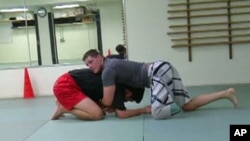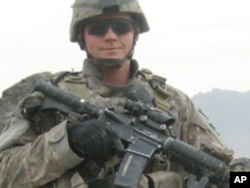Brazilian Jiu Jitsu is not your typical martial art. It combines wrestling and joint manipulation, and those who practice it say technique trumps size. But Tyler Anderson is not your typical martial artist either. For the U.S. Army Staff Sergeant, learning this new skill is just one of his life’s many challenges.
When Anderson took up Brazilian Jiu Jitsu, he found things were a little different from his previous wrestling experience.
"When I first started doing Jiu Jitsu without a leg, the first thing that I noticed was I was a really good wrestler and body control is something that I was very good at," he says.
Anderson lost his leg patrolling in Kandahar Province, on his second tour in Afghanistan.
“We sent a team around for security and I went to clear the road, once I thought the road was clear, I looked back to call my team forward, that took pressure off of the mine that I had been stepping on, it exploded. Initially it took off my leg below the knee, a finger, and a lot of shrapnel on the inside of my leg.”
While he was in the hospital after his injury, the decorated veteran found his calling.
“Once you get injured you come to the hospital, it’s kind of tough to be just sitting in a wheelchair and get taken out of that lifestyle," says Anderson. "For me Jiu Jitsu is really a release, it’s a form of helping me focus. I’ll admit that being active and missing a leg is a totally new world that you don’t know about. It’s a little scary to think that you might not be able to do the active things that you use to do.”
As family and friends rushed to Anderson’s side, he also had a visit from a man named Luis Pantoja.
“Luis himself came to the hospital asked me if I wanted to do Jiu Jitsu and I jumped right on it, I was very excited," says Anderson. "It’s guys like him that give us the opportunity to take the time and want to get in there and show us that you know you have a disability but you can still do the things that everybody else does.”
Pantoja teaches Jiu Jitsu for the Wounded Warriors’ project at the Walter Reed Medical Facility in Washington. It's a rehabilitation center where injured American soldiers come for treatment.
“I’ve been working with Tyler for over six months, and you know he s a very dedicated student, he picks things up very fast and it’s actually satisfying to see people improve overall," says Pantoja. "I’ve seen what Jiu Jitsu has done with my life. Pretty much all my friendships come from Jiu Jitsu, so I see what it can do to people and how motivating it is."
Teaching amputees poses its own challenges and is also a learning process for the instructor.
“I have to think a little bit harder about how can I adapt my techniques for these guys. Their balance might be a little compromised due to, for example, an amputation,” says Pantoja. “To be honest with you it’s not just me teaching them, I learn a lot from them, and we kind of throw back and forth ideas. So it has actually made me grow as an instructor, as a Jiu Jitsu practitioner in general. I’ve learned a lot just working with these guys.”
Pantoja’s friendship and teaching helped speed up Anderson’s recovery. The soldier has learned how to use his new body, and continues changing with the world around him.
The Purple Heart winner says the message is simple. “Really the biggest thing is just to get out there and do it. Don’t give up. That’s about it. That’s all you can do is just keep on.”






